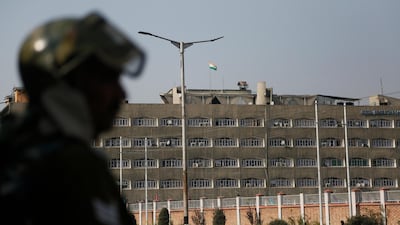The Indian government posted extra forces in Jammu and Kashmir on Thursday as its decision to split the state into two federally-administered regions formally took effect.
Just after midnight on Wednesday, the state became two union territories - one Jammu and Kashmir, and the other the Buddhist-dominated enclave of Ladakh.
"The unfulfilled dream of integrating Jammu and Kashmir has been accomplished," said Home Minister Amit Shah.
Mr Shah, a close aide of Prime Minister Narendra Modi, is leading the government's political strategy to deal with a three-decade insurgency in Kashmir. India and Pakistan each control a part of the region but claim it in its entirety.
Headed by a lieutenant governor appointed by the federal government, the new Union Territory of Jammu and Kashmir will have its own elected assembly with a five-year term, but most powers will be retained by New Delhi.
Ladakh, a high-altitude desert region that borders China, will be under the federal government's direct administration with its own lieutenant governor.
"We are happy that Jammu and Kashmir and Ladakh are moving towards a new future from today onwards. Ladakh and Jammu and Kashmir today are taking steps for their bright future," Mr Modi said on Thursday.
His government sent thousands of additional troops to Kashmir, arrested hundreds of politicians and activists and cut off phone and internet services as it announced its decision on August 5 to scrap a constitutional provision that gave the state special status.
The move, later approved by parliament, took away Jammu and Kashmir's right to its own constitution, laws and flag. It also removes Kashmiris' exclusive land rights, allowing people from elsewhere to buy property.
Access to around half of mobile phones was only restored on October 14 and the internet remains cut for the Kashmir Valley's more than seven million people.
The UN High Commission for Human Rights in Geneva said on Tuesday that it was "extremely concerned" at the situation.
"We urge the Indian authorities to unlock the situation and fully restore the rights that are currently being denied," it said.

